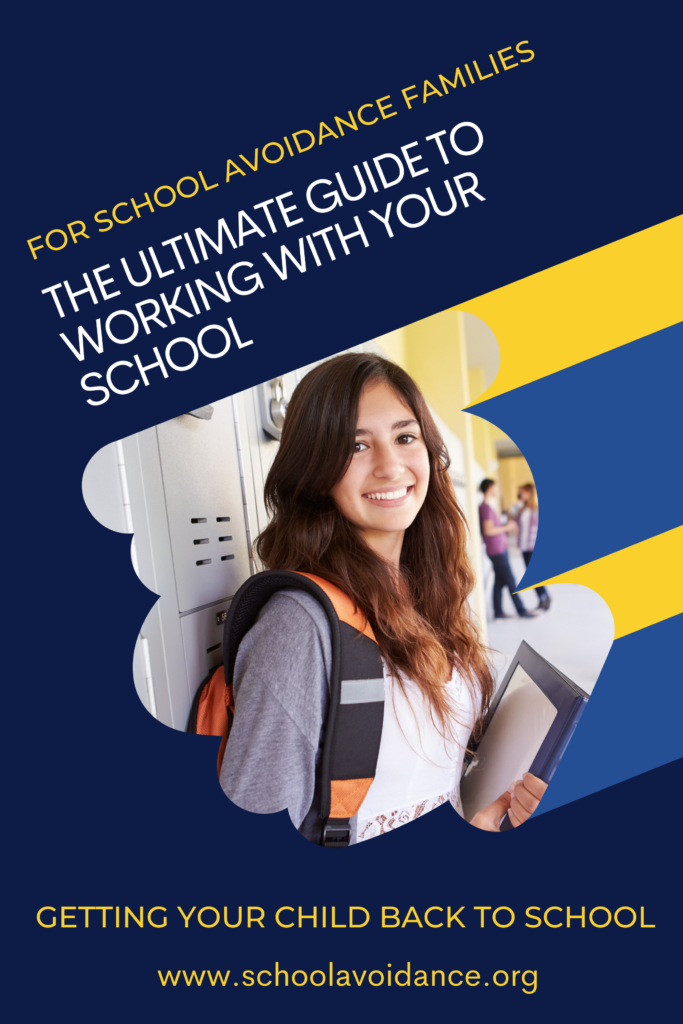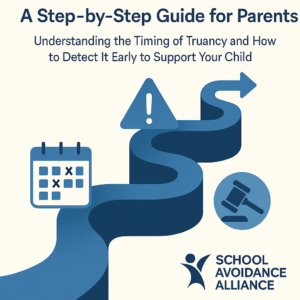
Recognizing and Responding to Truancy: A Step-by-Step Guide for Parents
Understanding the Timing of Truancy and How to Detect It Early to Support Your Child Truancy, or unexcused absence from
Welcome to our School Avoidance Alliance blog. We are happy to see you here.
This is where we share articles, interviews, and information that provide help, hope and support to school avoidance families and educators.

Understanding the Timing of Truancy and How to Detect It Early to Support Your Child Truancy, or unexcused absence from
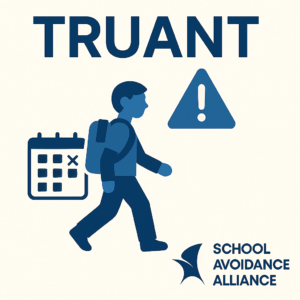
In the landscape of education, one term frequently discussed—but often misunderstood—is truant. School absenteeism, especially without valid reasons, can have
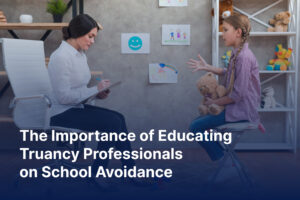
Why you should prioritize educating your staff on school avoidance Providing your school team with a comprehensive education on school

Marginalized communities refer to groups of people who experience systematic social, economic, and political disadvantages due to various factors such
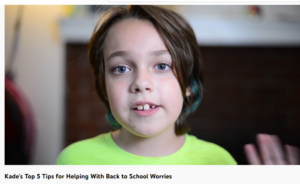
We had the pleasure of hearing from Kade in our private FB group for school avoidance families. It’s not often

For all you parents reading about 504 Plans, FAPE, IEPs, IDEA and ADA, laws, take a minute to laugh and get inspired.

The Americans with Disability Act (ADA), Amendments Act of 2008 Expanded Section 504’s Reach. Clarifying How School Avoidant Kids Can Qualify for 504 Plans

Working with your school is key to getting your school-avoidant child back into the building. Whether you have an intervention

Dear Schools and Educators, We wish you all an excellent start to the 2021 school year. We know your staff
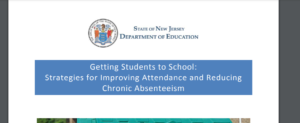
Chronic school absenteeism is an issue that schools, states, and the federal government have on their radar. When they talk

Don’t miss this opportunity to learn from leading School Avoidance expert Chris Leonard LCSW, M.Ed Chief Learning Officer at Thrive

School avoidance brings a new set of questions and challenges for schools. The responsibility of who will be involved in

This is the first post written by L. Reddan, who is a Licensed Professional Counselor (LPC) on a High School Counseling team, and an experienced professional helping kids with school avoidance get back to school.
L. Reddan will be writing under a pseudonym in order to speak freely about pervasive issues in our school system as it relates to school avoidance and inclusion.
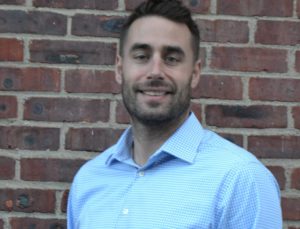
The following information is from a candid discussion that I had with Dr. Steven Myers, Licensed Psychologist, Certified School Psychologist, and Board Certified School Neuropsychologist. He has been a practicing School Psychologist in New Jersey for the past 14 years and maintains a private practice in Bergen County.

A discussion with Dr.Naoki Maeda of the School of Social Welfare, Kyushu University of Health and Welfare, Nobeoka, Japan
Have you heard that exposure therapy is the treatment of choice for school avoidance?

For some reason, the role of the behavior analyst (Board Certified Behavior Analysts, BCBA) has been under the radar. They shouldn’t be, though. They can play an integral part in helping kids get back to school.

I had a lightbulb moment when I read this article by John Reily’ which discusses using hybrid learning as an opportunity for school refusal reintegration. Why wait until the Fall when it will be the same environment as before. Now is the time for schools to work with the families while there are fewer kids in the building.
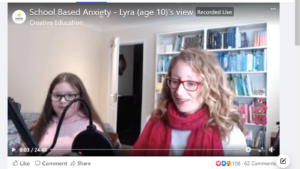
This is one of my top ten learning resources regarding anxiety-based school avoidance.
It is a video from Lyra, a very articulate 10 years old discussing her difficulties of going to school.
She provides keen insight into what has helped her get back to school.

We know that school avoidance is often misunderstood. Our friends and schools may question our parenting skills. They may share simplistic and insensitive advice. They usually mean well, but sometimes it hurts.
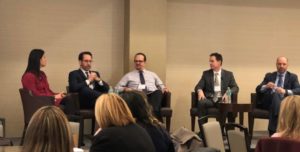
A few years ago, NPR did a piece called “Mental Health in Schools: A Hidden Crisis Affecting Millions of Students.” They cited that “nearly 80% of kids who need mental health services don’t receive them. Experts say schools could play a role in identifying students with problems and helping them succeed. Yet it’s a role many schools are not prepared for.”

The following are some very powerful insights that will help you better understand what a child who has an anxiety disorder, school refusal, or other emotional disorder feels while at school.

This article from Yale News features promising research about how parent training can help improve anxiety levels, tolerance and outcomes in their children. According to Dr. Eli Lebowitz, Director of the Program for Anxiety Disorders at the Yale Child Study Center.

During an anxiety-fueled situation with my daughter, she has often yelled at me that I just don’t get it. I understand her point. I do have a general idea of her thoughts and feelings but I am not in her shoes per se to feel the extreme discomfort and hear her mind speaking to her.
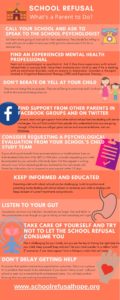
It’s quite bewildering when your child starts refusing to go to school. This isn’t anything that we were trained for as parents. Once this becomes a pattern, a disruption, or starts to cause a negative impact, then it is time to take immediate steps to help your child.

This is a good piece put together by Lauren Hoffman, PsyD and Steve Mazza, Phd from Columbia Psychiatry. It covers a few simple ways that you can help manage you and your child’s anxiety right now. They also provide some useful links for relaxation and entertainment.

“Every Child has a Portfolio of Who They Think They Are.”
When I heard these words at a presentation of The Nurtured Heart Approach; I immediately felt them through the eyes of a child who has school refusal. I sensed how using the Nurtured Heart Approach could build inner-wealth within a child who is challenged with school refusal.

Today I realized that this is a real issue. In some instances, schools have denied children with Individualized Education Plans (IEP’s) or 504 plans access to advanced classes. This is clearly against the laws of the Individuals with Disabilities Education Act of 2004 and the right to a Free and Appropriate Public Education (FAPE).
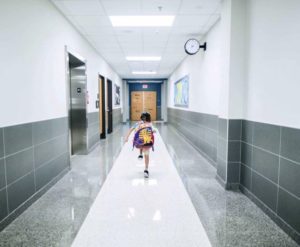
When I was in the thick of things with my son’s school refusal, I wish I could have spoken to other parents dealing with the same problem; discuss what was working, what failed, and just the support from another human living a similar experience would have provided comfort.
School refusal is complicated. There is no universal protocol and there is limited research to guide us. Therefore, an interchange of ideas and information is key to helping our kids.
Disclaimer: This site is designed by School Avoidance Alliance to assist parents, family, friends, caregivers, educators, advocates, and other professionals involved with helping children and finding resources to understand, help and cope with school avoidance, as well as to increase public awareness regarding school avoidance. The contents of this website are presented for informational and educational purposes only. Nothing on this website is to be construed as professional advice on medical, legal, technical, or therapeutic matters. By accessing and using the information on this site, you agree to waive any rights to hold the site developer(s), or any individual and/or group associated with this site, liable for any damage that may result from the use of the information presented.
Unfortunately only a small percentage of school professionals, therapists, educational advocates and policy makers understand school avoidance best practices. So, you must become the expert to ensure your child is getting:
The time passing slowly without progress is the worst feeling. It wouldn’t have taken five years of suffering and uncertainty if I had this expert guidance during my son’s school avoidance. We would have saved $29,000 in lawyer fees and $69,000 for private schools.
